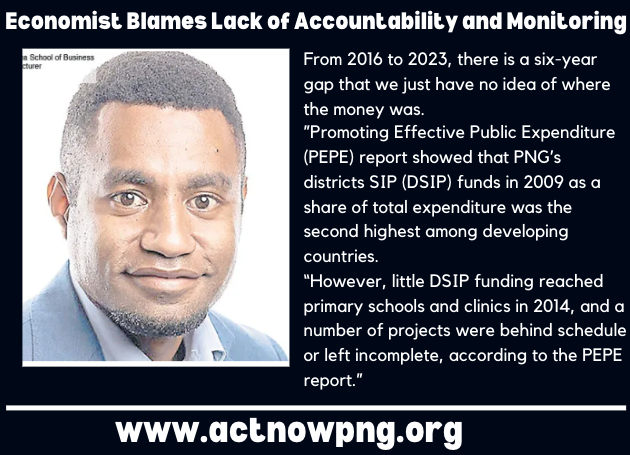
The National | February 7th 2024
There is a lack of accountability and monitoring of Service Improvement Program (SIP) funds in the country, as economist says.
Maholopa Laveil, a University of Papua New Guinea School of Business and Public Policy economics lecturer, told The National that the last audit for these funds were carried out more than six years ago.
“The Department of Implementation and Rural Implementation (DIRD), tasked with monitoring SIP expenditure and projects, last reviewed it in 2016,” he said.
“From 2016 to 2023, there is a six-year gap that we just have no idea of where the money was.”
He said that the 2014 Promoting Effective Public Expenditure (PEPE) report showed that PNG’s districts SIP (DSIP) funds in 2009 as a share of total expenditure was the second highest among developing countries.
“However, little DSIP funding reached primary schools and clinics in 2014, and a number of projects were behind schedule or left incomplete, according to the PEPE report,” he said.
Laviel said the non-submission of acquittals by districts and provincial administrations to the DIRD made it difficult for the department to report to the Auditor-Generals Office.
“Many districts do not provide acquittals which are supposed to be submitted to the DIRD,” he said.
“Acquittals for projects are rarely made and the department rarely reviews or monitors SIP projects.
“All they have to do is show receipts on what they actually used the SIP funds for, and the business entities hired to run projects.” If the DIRD doesn’t receive those acquittals, it can’t provide the project site visits and cannot provide those reports to the auditor general’s office,” He said although PNG’s DSIP spending was some of the highest in the world, actual DSIP funds disbursements since 2013 failed to meet their budgeted target.
To know more about DSIP and your district DDA visit www.ddawatch.org
